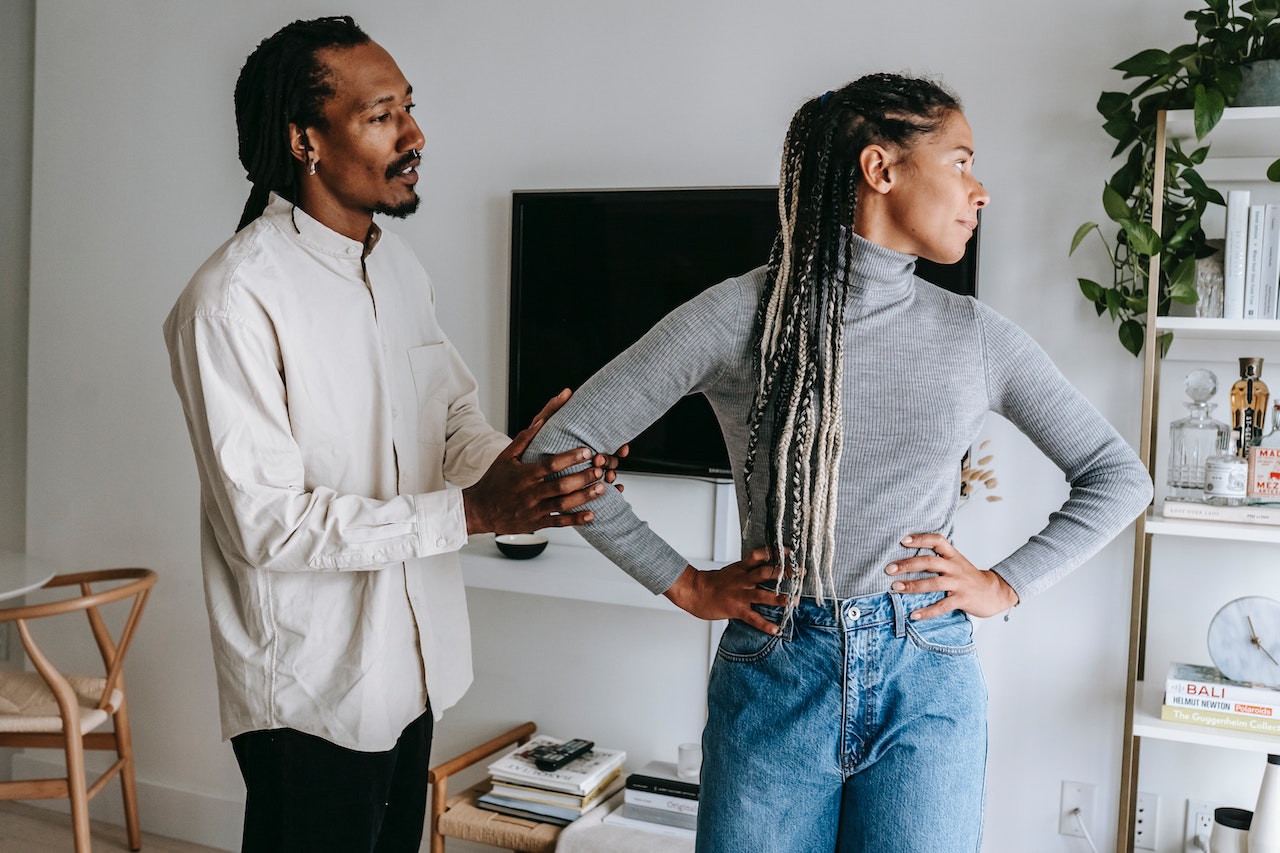How to Stop Being Possessive And Reclaim Space And Trust
Discover the meaning of possessiveness, its most common signs, and helpful tips on how to stop being possessive to ensure your relationship is healthy and happy!

Possessiveness is a feeling of ownership — a control you want to exercise over someone or something. It can be a sign of insecurity or an unhealthy attachment to another person. Every person naturally feels a little protective of their loved ones. However, when this feeling turns overbearing, it can start affecting your relationship with other people negatively.
Excessive or irrational possessiveness can often lead to feelings of insecurity, disrespect, emotional abuse, trap, fear, and anxiety and showcases your inability to trust the other person. From typical signs of possessiveness to valuable tips on how to stop being possessive — this guide will provide you with all the necessary information you need. This, in turn, will help you learn how to trust without feeling overwhelmed, recreate vital space between you and your loved ones, and build and sustain healthy relationships.
What Is Possessiveness?

Possessiveness is simply a feeling that you get when you have a strong desire to control or own something or someone like a childhood toy, your BFF, your partner, a favorite parent, etc. It is usually associated with jealousy and insecurity. Overprotectiveness often arises when you feel threatened by the possibility of losing something (maybe your favorite item) or someone you care about deeply. Possessiveness can manifest itself in different ways, such as feeling overly protective of a person or object, wanting to constantly monitor your partner’s or close friend’s activities, and feeling threatened by any perceived rivals. For example, in relationships, possessiveness can be seen as jealousy, controlling behavior, and distrust of your spouse. In friendships, possessiveness can be seen as being highly competitive and craving all the attention. In family terms, possessiveness can take the form of overprotectiveness, like controlling who the other family members interact with or what they do with their time.
Possessiveness can lead to unhealthy relationships and other negative consequences if it is not addressed on time. Hence, it is crucial to recognize the common signs of possessiveness before you lose everyone close to you.
Common Signs of Possessiveness
Now that you know what possessiveness means, let us acknowledge some of the most obvious signs of possessiveness.

Common signs of possessiveness include:
- feeling jealous,
- trying to control your partner's behavior,
- becoming overly attached or dependent on your partner,
- checking your partner's texts and emails,
- constantly questioning your partner's, best friend's, or family member's whereabouts,
- a lack of sense of boundaries,
- attempts to control the way the other person looks before going out,
- the use of guilt or emotional blackmail to manipulate others into doing what you want,
- irrational fear of losing your close people, and
- excessive defensiveness.
Moreover, from trying to isolate their partner from friends and family and becoming too critical of their partner's actions to trying to restrict their freedom – at times, possessive people may even let anger overpower their decisions.
If you relate to these signs, try to address your possessiveness with our below-mentioned tips before it becomes too damaging.
13 Useful Tips on How to Stop Being Possessive
While subtle jealousy is not a wrong feeling, irrational or excessive possessiveness surely is a harmful emotion that can wreak havoc in your relationships.
1. Ground Your Thoughts
Collecting your thoughts helps you to stop overthinking about a situation while allowing you to manage your emotions better. So, instead of thinking about all the negative outcomes of a situation and hyping your possessiveness, try to ground your thoughts. Reflect on them and ask yourself the reason behind your cynical thinking. Take a deep breath and trust your partner, family, or close friends. Most importantly, ask yourself if they have ever given you a reason to suspect them, and you will understand that your possessiveness is simply not required.
2. Share Your Insecurities with Your People

Many of you have insecurities that not only make it hard to open up to your loved ones but also ignite your possessiveness. From feeling embarrassed to ashamed - you may not want to share your feelings with them. However, please remember that every person has their own fears. It is completely okay to talk about them to the people who mean a lot to you. It may take some time or overcoming uneasiness for you to open up about your dark side or experiences. But, by sharing your insecurities or fears with your close ones, you are allowing them to better understand you, your mindset, and your behavior. Moreover, once they understand the reason behind your controlling attitude, they will try to help you to resolve those anxieties, thus enhancing the bond.
3. Ask Open Ended Questions
Asking open-ended questions is one of the best ways to help yourself and your partner become less possessive. Open-ended questions encourage meaningful conversations, allow for a deeper understanding of each other’s opinions, and can help you both learn how to communicate with each other in a much better way. Moreover, such questions make the receiver believe that you are giving them the benefit of doubt rather than being dominating. This, again, helps to smoothen your connection with your loved ones.
4. Listen to the Other Person's Perspective

When you are excessively possessive in your relationship, you start making your partner develop feelings of insecurity and distrust. Such negative emotions will make it hard for both of you to find a healthy balance between feeling secure and having the space and freedom to be themselves. So, learn how to listen, understand, and respect your partner's perspective if you wish to control your possessiveness. Please remember that listening with an open mind will help both parties in the relationship feel heard, respected, and understood. Moreover, by taking the time to listen and understand each other’s perspectives, you as a couple can work together towards finding a healthier balance in your relationship, leaving behind the burden and negativity of possessiveness!
5. Consider Their Discomfort
Being possessive in any relationship can be a serious issue and can cause discomfort for both people. However, often, the possessive person fails to understand this subtle point. So, next time when your controlling behavior takes the front seat, and you start bugging your close ones with questions that are not necessarily required, take a step back and count to 10. Take a few seconds to reflect on your words and how they would affect the other person. You can also use your words on yourself to understand how gravely they may hurt others. Once you do realize this, find a better way to address your concern or confront the other person directly to have an honest talk with them.
6. Own Your Mistakes

An immensely famous adage says, "To err is human, to forgive divine." This means that as a human, it is natural to make mistakes. The only significant thing is that we own up to them. When you become possessive of your mistakes, it often leads to negative feelings such as guilt and shame. Over time, such emotions can become difficult for you to overcome if you continue not to take care of them. We suggest that you start taking one step at a time and reflect on your mistakes, for example, revisit the things that you told your best friend when you feared they were getting closer to someone else. Ask yourself if that reaction was required or if they were hurt after listening to your comments. Own them rather than letting them define you. Moreover, accept responsibility for your actions by acknowledging your errors and taking corrective measures when needed. Also, practice self-compassion by being kinder to yourselves instead of letting your possessiveness take over. Once you start taking ownership of your words and actions, you yourself will see that your relationships and life, in general, are improved exceptionally.
7. Re-focus on Your Life
Often irrational possessiveness stems from intrusive thoughts and bad past experiences. The trick here is to try to channel that energy into believing that you are living your best life. So, the next time you see clouds of doubts lingering in your mind, train your mind to look at more positive and bright sides than negative ones. Continue practicing it while trying to let go of things that you cannot change. Simultaneously, push yourself to break your old habits and patterns and shift your mind into doing things that you like. Trust us, you will start feeling free, stop being possessive, control your emotions, and build happier relationships with yourself and others.
8. Recognize Your Triggers

By understanding the underlying causes of your possessiveness, you can take steps towards managing it more healthily and improve your bonds with others. While some people become possessive due to their past trauma, others fear that their close ones will abandon them, and for some, it is a mere tool to hide their insecurities and anxieties. So, we would advise you to sit with your thoughts and ask yourself what makes you extremely possessive. In case you are finding it challenging to pinpoint your trigger, seek advice from a professional expert.
9. Practice Appreciating Your Close Ones
One of the most modest tips on how to control your possessiveness is to do the exact opposite of this feeling. So, the moment you feel the urge to control someone's actions, behavior, clothes, etc., divert your mind into thinking about all the good qualities about them. Think about all the happy times that you have shared with them, and the memories, and acknowledge their strengths. With time and practice, offer compliments and start appreciating your loved ones for everything they do for you. By following this approach, you will soon be able to foster healthier connections with those who mean something to you.
10. Take Time to Know the Other Person

First things first, none of us are perfect, and Raheem DeVaughn has described it perfectly "Every flaw, scar, or mark you may have added to your beauty." So, the next time you feel the need to control someone, ask yourself how much do you genuinely know them or if your judgment is right. By understanding each other’s needs and respecting boundaries, you can create an atmosphere of trust and respect. Moreover, give the other person the benefit of doubt and take the time to genuinely know them. Once you do, you will see why and how they behave in certain ways or situations. This, in turn, will let you be more patient and understanding during disagreements or misunderstandings. Additionally, when you focus on understanding the other person, you realize why such circumstances happened and how you can both work together toward a better solution. Soon, you get rid of your unreasonable possessiveness and build a strong, healthy, and long-lasting relationship!
11. Connect on Emotional And Mental Levels
To control your possessive trait, you must work on building trust with people you care about. Building trust requires connecting on emotional and mental levels with the other person. This means having honest conversations about how you feel, communicating openly about your needs, and respecting each other’s boundaries. It also involves understanding that no one is perfect and that everyone makes mistakes sometimes. When you learn how to connect emotionally with your loved ones, you will effectively create an environment of mutual respect that will further help you control your possessiveness in relationships.
12. Stop Trying to Change Others
One of the best ways to control your possessiveness is to let go or free your mind. Simply accept them as who they are and let go of your expectations and perceptions of others. Trying to change others is a hopeless effort that can lead to frustration and resentment. Do not be overprotective to change the other person into becoming something that resembles your mindset or expectations. Instead, see if that person is adding something valuable or meaningful to your table. Moreover, please understand that you cannot control other people’s behavior or thoughts. Rather, focus on yourselves and your growth. In no time, your irrational possessiveness will be replaced by a contented and peaceful life and connections!
13. Practice Trust-building Exercises

Possessiveness can be a major source of tension in relationships that often arises because of insecurities and trust issues. So, trusting your partner is your chance to improve and create a strong and lasting relationship with them. Here, trust-building exercises can help you to stop being possessive. Trust-building exercises can include activities that help you to recognize your own feelings of possessiveness and constructively work through them. These activities may include communication exercises, boundary setting, and self-reflection. When you constantly practice them, you slowly develop confidence in yourself and the people you care about. This understanding ultimately helps you build greater trust in your relationship!
Conclusion
Possessiveness is common and one of the major obstacles that can cause a lot of tension, misunderstandings, and hurt in relationships. Although possessiveness can be a demanding issue to tackle, it is not impossible. Since understanding and recognizing the meaning of being possessive and the most common signs of it are the first steps towards overcoming it, we curated this ultimate guide in an easy-to-comprehend format to help you overcome the challenges of being possessive in a relationship. With this knowledge, you can acknowledge how to stop being possessive and take the necessary steps mentioned towards developing healthier relationships with your partner and loved ones.
Also, please remember, if you are struggling to move past your possessive nature, it is always advisable to seek consultation or counseling from a professional relationship expert. Not only will they be able to figure out the root cause or trigger behind your overprotectiveness, but will also help you overcome it so that you salvage your friendships and relationships and lead a happy life!
ALSO READ: Relationship Advice: 7 Tips to deal with a jealous and possessive partner





 JOIN OUR WHATSAPP CHANNEL
JOIN OUR WHATSAPP CHANNEL











































